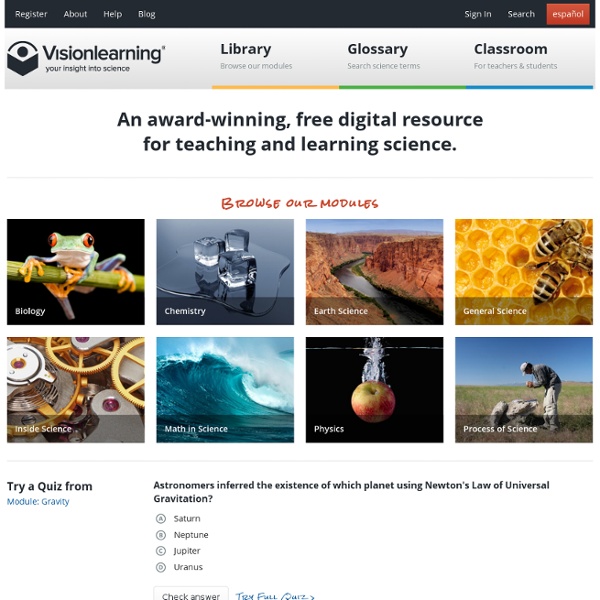



Teachers Homepage - National Geographic Education This website would like to remind you: Your browser (Firefox 17) is out of date. Update your browser for more security, comfort and the best experience on this site. Educators! Xpeditions is now archived in National Geographic Education's new website—natgeoed.org If you liked Xpeditions, you'll love the new media-rich natgeoed.org. www.natgeoed.org Please note: to search for Xpeditions content, check the “include archive” filter. National Geographic Education Twitter Facebook Google+ Email Quiz Connection! Most Popular Latest Videos Giant Traveling Maps Get great resources for introducing geography and map-reading skills to students in Grades K-8.
Resources for Teaching Chemistry Hands-On Chemistry Activities with Real-Life Applications Hands-On Chemistry Activities With Real-Life Applications contains over 300 intriguing investigations designed to engage students in a genuine pursuit of science. Because of the favorable response to Hands-On Physics Activities, the authors used the same approach and philosophy in writing this resource. This hands-on, inquiry-based approach to teaching and learning science follows recommendations set forth in the National Academy of Sciences' National Science Education Standards and the National Science Teachers Association's Scope Sequence and Coordination Project. Chemistry Demonstrations Chemistry Demonstrations - Links from the Catalyst. Reference Periodic Tables - Interactive periodic tables... Other Resources Chemmaters - ACS magazine for high school chemistry students. Chemistry Laboratory Laboratory Safety - Laboratory safety for the chemistry classroom. Teacher Resources Chemistry Curriculum - Planning
Turn-O-Phrase - Word Puzzles NORDLAB.SE - Institutionen för didaktik och pedagogisk profession, IDPP, Göteborgs universitet NORDLAB-SE är en äldre rapportserie med material som fortfarande är användbart. Den behandlar, i form av ett antal 'workshops', några aspekter av naturvetenskap. Ett genomgående drag är att de tar upp forskningsresultat angående elevers vardagsföreställningar om naturvetenskapliga företeelser. Vissa av rapporterna i NORDLAB-SE ingår även i rapportserien Ämnesdidaktik i praktiken. Ladda ner rapporterna som pdf-filer Inom detta tema behandlas växelspelet mellan teori och observationer, liksom att välja lämpliga system och att genomföra kontrollerade experiment. Det är elevernas möjligheter att förstå skolkursernas naturvetenskapliga innehåll som står i fokus för detta tema. I detta tema ingår frågor om natur och moral och hur elever uppfattarvissa miljöproblem ur både natur- och samhällsperspektiv.
London Lives 1690 to 1800 ~ Crime, Poverty and Social Policy in the Metropolis Biologi, fysik, kemi och teknik - undervisningsstöd Här hittar du som lärare material som kan ge inspiration till arbetsområden som utmanar elevers tankar och idéer. Undervisningsstödet är uppdelat ämnesvis och i årskursintervallerna 1-3, 4-6 och 7-9 och visar på en progression i både centralt innehåll såväl som i de förmågor som eleverna ska utveckla. Biologi: Vilken nytta har vi av naturen? Vilken nytta har vi av naturen? är en samling förslag på övningar där eleverna genom sitt deltagande kan närma sig begreppet ekosystemtjänster. Här beskrivs en undervisning där elever får lära sig att använda begreppet för att diskutera de ekologiska aspekterna på hållbar utveckling. Vilken nytta har vi av naturen? Fysik: Hitta regler Hitta regler är en samling förslag på övningar i fysik som tar sin utgångspunkt i elevernas kunskaper om kraft och rörelse. Hitta regler Kemi: Matens kemi Matens kemi är ett förslag på hur ett arbetsområde kan organiseras. Matens kemi Teknik: Tekniska lösningar i vardagen Tekniska lösningar i vardagen
Skoltips för lärare - naturkunskap Uppsatser, faktablad och lektionstips samlade av Na-lärare Erika R. Du hittar sidor om botanik, kroppen, djur, miljö och mycket mer på bloggen Skoltips för lärare. Materialet spänner över hela Na-ämnet. Observera att materialet endast får användas i privat bruk, får alltså inte publiceras. Obs! På denna blogg kan allt material nedladdas kostnadsfritt. Beträffande skoluppsatser och faktafiler mottages gärna tips om eventuella texter eller bilder saknar adekvat källhänvisning eller har inhämtats på tveksamt sätt.
Skolprojekt Linné - Berättarteknik Idéhäfte 1 — Berättarteknik Hur kan torra fakta förvandlas till spännande berättelser? I häftet beskrivs en konkret metod för hur elever kan skapa berättelser med ett naturvetenskapligt innehåll genom att skriva, dramatisera och filma. Nedan finns pdf-filer på de olika avsnitten i idéhäftet Berättarteknik, samt kompletterande material i form av exempel och kopieringsunderlag. Berättelsen som pedagogiskt verktyg » (Bi-lagan 3-2003) Hela Idéhäfte 1 — Berättarteknik (2,4 MB) » Berätta om naturen (sid 2—3) » Torra fakta förvandlas till spännande berättelser (sid 4—16) » Små böcker skrivna av elever på Håksbergs skola, Ludvika kommun 2006 (sid 9) Skrivproceduren där karaktärsschema, hinderschema presenteras. 1. 2. 3. Kopieringsunderlag: Responsfrågor (sid 10) » Exempel på responssamtal — uven 1 (sid 10) Exempel på responssamtal — uven 2 (sid 10) » Övning på temat Lumumma och Takete (sid 14) Pdf » Kopieringsunderlag: Huvudkaraktären, skurken och hjälten (sid 16) » Exempel på responssamtal (sid 21) »